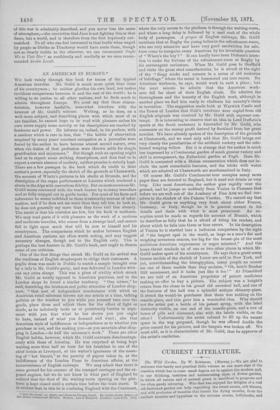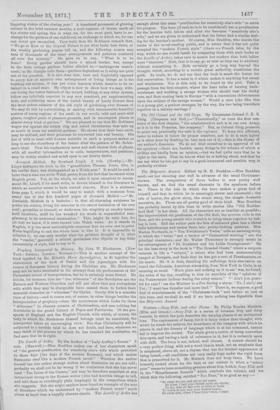CURRENT LITERATURE.
The Wild Garden. By W. Robinson. (Murray.)—We are glad to welcome this handy and practical little volume as one more sign of the reaction which has in some small degree set In against the modern and, to our thinking, tasteless and uninteresting style of flower-garden, in which all nature and of natural grace is sacrificed to gorgeous and too often gaudy colouring. Who that has enjoyed the delights of a real old-fashioned garden can help regretting the sweet scents, soft blooms, and wild profusion of beauties that herald the flying months, from the earliest aconites and hypaticas to the autumn crocus, hollyhocks, and lingering violets of the closing year ? A tossolated pavement of glowing colours in tho briof summer months, a neat expanse of brown earth all the wintor and spring, this is what wo, for the most part, have in ex- change for the gardens of our childhood, an exchange to which we, for one can never get reconciled. Very truly does Mr. Robinson remark that, "We go to Kw or the Crystal Palace to coo what looks best there, or the weekly gardening papers toll us, and the following season sees tens of thousands of the same arrangements and patterns scattered all over the country." Ho goes on to say, " What is to be done? Every gardon should have a mixed border, but, except in the little cottage gardens before alluded to—' umbrageous limo's- nests,' as Mr. Carlyle calls them—gardens dependent on it solely are quite out of the question. It is also clear that, intro and frightfully opposed to every law of nature's own arrangement of living things as is the bedding-out system, it has yet some features which deserve to be re- tainod on a small scale. My object is now to show how we may, with- out losing the bettor features of the mixed, bedding, or any other system, ollow one infinitely superior to any now practised, yet supplementing both, and oxhibiting more of the varied beauty of hardy flowers than the most ardent admirer of the old style of gardening over dreams of. We may do this by naturalizing, or making wild, innumerable beautiful natives of many regions of the earth in our woods, wild and semi-wild places, rougher parts of pleasure-grounds, and in unoccupied places in almost evory kind of garden." We aro pleased to see that Mr. Robineon wages war against the trimly dug and raked shrubberies that take up SO much of oven our smallest gardonn. Ho shows how their bare earth may be utilized, and their primness be converted into real beauty. His list of wild or semi-wild flowers suitable to such a purpose makes us lung to see tho shrubbery of the future after the pattern of Mr. Robin- son's ideal. That his explanatory notes cud well-chosen lists of plants, with all needful information as to soils, temperatures, and positions, may he widely studied and acted upon is our hearty desire.



































 Previous page
Previous page